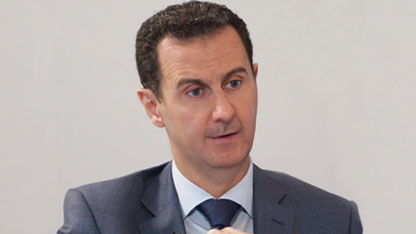President Bashar al-Assad said that the priorities of the state are to fight terrorism and provide a minimum livelihood to Syrian citizens, saying the political process was stillborn from the beginning because it was not built on negotiations between nationalist Syrians, but between nationalists and Syrians who were foreign agents.
He said that the Syrian participation in this process was to “avoid pretexts and to prove to everyone that the countries speaking about a political solution, specifically the West, were not trustworthy.”
In an extensive interview with Al-Watan, President Assad said that “not every opposition member is a foreign agent” but that he considered “the opposition which was tasked with conducting dialogue with Syria were agents — and this was a discussion which was unacceptable for us.” He affirmed his support for “Any dialogues between Syrians, when it is a Syrian-Syrian dialogue, between Syrians who are not a part of foreign agendas and do not support terrorism” in Damascus or in any other area. He said that there was no immunity (for anyone) from the law, in a reference to all opposition members abroad who wish to participate in this dialogue.
President Assad noted that the Gulf countries, Saudi Arabia and Qatar, had taken very hostile positions and who throughout history were one of the reasons for Israel’s survival and its dominance in the region, but that this did not make the people in Saudi Arabia or Qatar or other countries foes, while stressing that Israel remains the enemy.
President Assad revealed that there had been Russian mediation with Riyadh for about a year and a half, but it had failed because “Saudi Arabia has one aim, which is to turn Syria against Iran. We don’t know why we have to turn against Iran to please Saudi Arabia or satisfy their backwards mentality.”
He said that the relations with Egypt were “improving slowly, but the horizon remains limited to a security framework.” He said that these relations had declined to low levels during the Muslim Brotherhood rule of Mohamed Morsi, but they had not reached the degree of alienation “and not because Morsi did not want that or the Brotherhood did not want that, but because the military-security establishment did not want this rupture.”
President Assad said that the process of liberating eastern Aleppo recently did not come within a political framework but within the context of normal military actions. He added: “So that we are realistic, this does not mean the end of the war in Syria — but it is a major milestone in this direction.” He said that the war “will not end until the total elimination of terrorism … and we will continue the war against them.”
President Assad believed that the reconciliations are a different course from the Geneva process, saying that it is the “one solution available in parallel with fighting terrorists, and it has proven its effectiveness over the last two or three years, and has begun to accelerate. It is a solution which protects civilians.” He said that “in every reconciliation that has happened, the issue of hostages is the basis.” He added: “This is a priority for us because it is a major social and humanitarian problem, which the state cannot condone.” He added that the state is searching for “a mechanism or channels of communication with the terrorists in order to liberate” the hostages.
President Assad said that there were four points which had contributed to the resilience of the Syrian economy, which were: First, “the desire for life among the Syrian people of various professions in the public and private sector”; second, “the foundations upon which the Syrian economy has been built for decades”; third, “the state, after two or three years, which it seemed that the war might continue for years, moved toward non-traditional solutions, which were not acceptable in normal situations before the war,” in addition to “foreign support which came from friends, especially Iran and Russia.”
Regarding the issue of reconstruction, President Assad said that “it will take off … especially when there is security.” He added that “friendly countries will be the first to contribute to this field through their companies and loans.” He added: “I do not believe that the Syrian people would accept any companies from hostile countries to carry out reconstructions and make a profit from the war that they started.” However, “many countries which vowed hostility to us will look for companies in friendly countries to be their front in rebuilding Syria.”
President Assad stressed that “corruption cannot continue without being held to account.” He said that “the problem of corruption does not lie in the inability to hold it to account but in the inability to detect it.” He pointed to the need to “increase efforts on the national level and on the community level for the detection process.” He stressed that “the nation’s priorities now vary — first… to terrorism, and second to provide a minimum means to life for Syrian citizens.”
He believes that “the popular forces (like the National Defense Forces) are not an option for the nation, but are an experience imposed by all national wars in any country in the world.” He said that “this experience has positive and negative effects. In our case they were very positive and achieved military gains on the ground. But there are always negatives connected, such as corruption in individual cases.”
He said that “there are cases where arrests have been made, and I know them in detail, however there are others that have not been settled.”
This article was translated and edited by The Syrian Observer. Responsibility for the information and views set out in this article lies entirely with the author.


